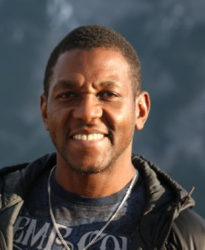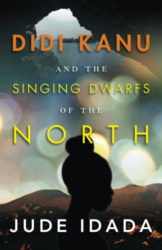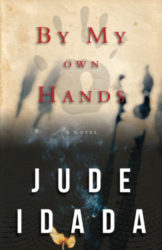A deep craving to add value to lives is what drives film director, playwright, script writer, novelist and poet Jude Idaba who is of the opinion that his words introduce cultures, which work to create a more tolerant society.
After years of ignoring his artistic calling in collusion with those around him—especially his now-dead father, a wealthy Nigerian lawyer who felt his son would be throwing his future away if he took such a road—Idaba is where he needs to be.
The Canada-based creative being has a mind that seems to work on overdrive; there is a film, novel or poem in everything he sees, touches or hears. He is always learning new cultures and visiting new places or meeting new people is what he lives for, as this means his work evolves.

After a conversation with Idaba, you could walk away thinking that you can also write a film or a novel because of how easily he speaks about it and how seamlessly he moves from one subject to another. His blunt but truthful outlook may rub some the wrong way, but as he puts it what you see and hear and even feel from him is who Jude Idaba really is.
A chance meeting with the Sunday Stabroek quickly resulted in an arrangement being made for a sit-down interview. Idaba was in Guyana directing the play Brixton Stories, written by another Nigerian, which was produced by Executive Director of Artistes In Direct Support Desiree Edghill as a fund-raising venture for the cash-strapped non-governmental organization. He did not say it but maybe a film or novel inspired by Guyana will be forthcoming, since, in his own words, he “totally” loves Guyana.
“Totally in love and unabashedly taken by its charm. It grows on you. You come a stranger and you leave a lover,” were his words to be direct. And further Guyana’s streets and people, though multicultural, remind him of his home country Nigeria. “A certain zest for life and inability to fall in line,” was his description of the two peoples. The two countries’ architecture is also somewhat similar even though Nigeria has skyscrapers. “There is still a sameness to the town planning and general ambiance,” he said.

“I try to use all tools available to me to tell stories: the sounds, lights, words, camera, movement etc… and in doing that I reinvent the wheel while exploring the new frontiers.”
All of this comes from a deep craving to add that value wherever possible like a well of overflowing, reaching and overrunning people.
“I am an avid reader and addictive movie watcher. I am also a keen observer and a patient listener. So I am like the fly on the wall and the unseen guest. I watch life, record life, spin it into an intriguing web and express it, in order to enthrall my readers and make their lives better in more ways than one,” was his description of himself.
A long time ago
Idaba believes that his journey into the artistic world started since he was a child but because it was frowned upon it took years before it became a reality. He said that as a child he did not speak a word until he was two years old and when he did it was an entire sentence. His aunt was assisting him to cut his birthday cake, when he said to her ‘Give me the knife.’
Years later, he commenced studies to become a doctor then switched to agricultural economics, but did not complete it. Finally, after nine months of being at home “doing nothing,” Idaba cut a deal with his father. The détente, as he put it, was agreed to because his father did not want society to look down on him for having an out-of-school son and so he commenced studying theatre and film, which saw him graduating five years later at the top of his class.
But even after this success, it was not the artistic world that he entered. Ironically, he became trapped in the walls of the corporate world after an offer was made. He later immigrated to Canada and continued on the same path until some of his writings came to the attention of his immediate boss who in turn told him he was wasting his talent by continuing to toil in the corporate world.
Idaba needed no further encouragement and promptly quit his job, sold his property and made his first film, The Tenant. It was a resounding success.
“I have not looked back since then. I have written five books, countless plays and films, directed films, conducted workshops and given lectures and my star has been on the rise,” he told this newspaper adding that he was happy he took the “dive” out of his comfort zone because if not he would have been a dream “slowly wilting behind some desk in a nine to five world.”
Instead he uses his diligence from his “inner man” to use his God-given talent which at times wakes him up in the middle of the night with ideas to put on paper. He is driven by his love for the arts and describes his work as the pebble being thrown into the pool of life which causes ripples of joy and true happiness.
Old and new Nollywood
One cannot have a conversation with a Nigerian filmmaker and not touch on that country’s film industry, properly known as Nollywood, which over the years has become very popular in many countries, including Guyana.
He said the industry has seen a huge development that is highly celebrated and was recently a focus at the Toronto International Film Festival.
“It has given the African experience a global resonance and created wealth and employment for millions of people. Nigerians are proud of it, and doubly so, when we see how people from other countries have embraced the industry,” Idaba said.
But—as always there is a but—what is controversial is that some see an old and a new Nollywood. The old Nollywood includes those who started the industry with low quality, poorly produced movies, with some exceptions.
The new Nollywood is made up of younger practitioners who went abroad to study filmmaking and put more global practice in effect as they make movies.
“There is a vast difference in the products of both old and new Nollywood,” he said. Old Nollywood sees the new filmmakers as ungrateful and disrespectful of the sacrifices they made to have an industry in the first place. New Nollywood argues that the dues have been paid and for the industry to grow, it has to embrace new methodologies, Idaba said.
He noted that the old is content with local awards while the new is in search of the first Oscar for Nigeria.
Idaba does not say where he stands in the fight between the old and new, but as he looks forward he believes he is on his way to the top, as while he is happy of his achievements he is intent on achieving more.
“There is more work to be done and I am excited to do what must be done, believing that the best is yet to come, and my star has not shined to the limit of its brightness,” he said.
He hopes to be acclaimed in all genres of the arts he is involved in and also hopes to work with NGOs and other change agents in spreading knowledge and giving aid to the needy.
“I see myself as a disciple of change and help and a person continually sharing love for the hungry, the thirsty, the sick, the lost and the ignorant. I see myself as a true servant and a humble soul doing all he can to make the world a better place…” he said.
Idaba is not married nor does he have children and as he puts it he is married to his work and does not believe that he should go out of his way to search for children and a wife as the universe “will always align in favour of the deserving. So I believe that when the time is right, a wife and kids will find me.” He added that he is aware of the danger of marrying because of societal expectation, a mistake many make. “I am looking for that independently minded and strong woman, who is sufficient onto herself, with her own dreams and aspirations…a true companion…because in the final analysis, I am averse to drama, my yoke is easy and my burden is light,” the Nigerian said frankly.
Idaba has written six books, he has written and directed several films and some have gone on to win awards, and he has lectured on films and is an acting coach.
He won best screenplay for The Talent at the African Movie Academy Awards and best stage play for Oduduwa – King of the Edos, amongst others.






